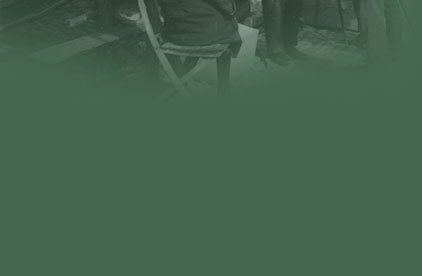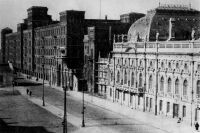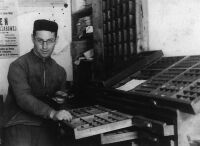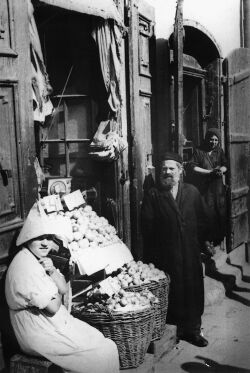





Factory and palace of Israel Kalmanowicz Poznański, Łódź, 19th century. Between 1860 and 1880 several dozens of assimilated Jewish families managed to made vast fortunes. Though in 1928 the I. K. Poznański Company was employing 10 thousand people, in the interwar period Jewish industrialists were not as succesfull as at the turn of century.
Jewish shop in Kraków's Kazimierz, 1937. The trade (over 40%) and in a lesser degree craft and services were main fields of the economic activities of the Jewish population in the Second Republic.
Jewish factory producing raincoats, Tarnów 1928. Though the Jews made up more than 20% of the company and craft workshop owners, only one in a ten of them employed more than 10 people.
|

The Jews dominated pedlary; in the wholesale trade their position wasn't that strong.
Shoemaker's shop. Craft workshops allowed one third of the Jewish population to make a meagre living.
Leopold Gottlieb, Portrait of doctor Bernard Kupczyk (1870-1941). In case of the Jews, who were practically devoid of any possibility of making a career in public service, it was advantageous to take up learned professions: physician (56%) and barrister or notary (33%).
Natan Lowenstein PhD (died 1932), barrister from Lvov, member of Austrian Parliament and in the independent Poland member of the Seym.
|

Warsaw Jewish district on Saturday. A statute of 18th December 1919 that banned working on Sundays, limited earning opportunities of the Jews, in case of whom the religious obligation of celebrating the Sabbath meant two-day break from working. It resulted in so called "labour ghetto", the Jews having to work for their fellow believers only, regardless of the economic effects.
Economic crisis that occured during the interwar period afflicted all the citizens but it were small merchants and craftsmen who suffered the most, two thirds of whom were Jewish. The Jews made up 50 % of clothing and leather industries and 70% of retailing. This urban nation inhabited not only big cities, where they made up one third of the whole population, but also small towns, where they often were in the majority..
The Jewish enterprises were not often succesfull, the most of them lived in poverty. Many perceived the education as the only chance for the better life. Legal and medical studies were particularly popular among the Jewish youth, because they allowed to launch a private practice.
Leopold Julian Kronenberg (1849-1937); financier, descended from the assimilated Jewish family of a Lutheran denomination; until 1926 the president of big Commercial Bank in Warsaw (founded by his father, Leopold); co-founder of Warsaw Philharmonic.
|

